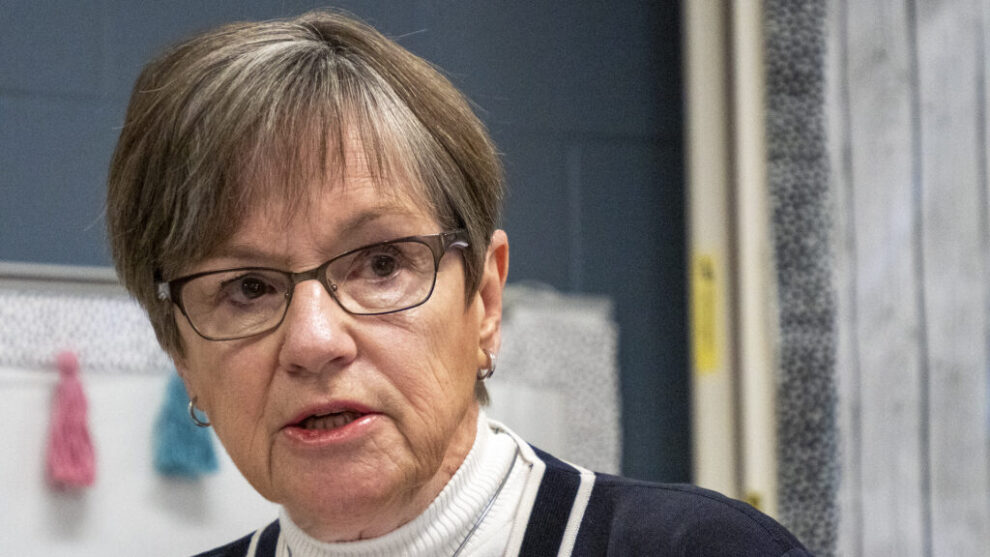The Kansas juvenile justice system is like a festering wound, said an activist saddened by lawmakers’ lack of action to help at-risk children and youths.
“We are not attending to the infection that exists in our country in general,” said Marquetta Atkins, a juvenile justice activist and community organizer. “But we want to put a Band-Aid on it by sending our kids to jail, and our wound is seeping when those kids come back out. Most of the time, they have more damage than when they went in.”
During an April 17 podcast recording, Kansas Reflector interviewed four members of Progeny, an Wichita-based organization working to transform the state’s juvenile justice system.
Atkins, executive director of Progeny’s campaign team, along with Yusef Presley, Desmond Bryant-White and Tyler Williams are focused on closing the remaining state youth prison in Kansas and empowering youth in communities most affected by juvenile justice needs.
Akins talked about Senate Bill 367, a pivotal juvenile justice reform measure passed in 2016. It shifted Kansas away from holding youths in group homes or state custody, instead relying on community programs and treatments. SB 367 included limits on probation and case lengths, making it less common for youths to be detained or sent to correctional facilities.
“Every time I see people go up and try to demolish that bill or change that bill, it makes me sick to my stomach because our kids are not throwaways,” Atkins said. “We need to be doing better.”
Though juvenile incarceration rates and youth arrest rates have decreased in the six years since the legislation was implemented, officials have said young offenders aren’t receiving proper treatment and have high recidivism rates.
The state has millions set aside for juvenile crisis center funding and other reforms, which could potentially solve the current lack of resources for juvenile offenders, but it hasn’t used any of the funding.
Presley, who has spoken extensively about his own experiences within the foster care to juvenile prison pipeline, said the lack of action is telling.
“It’s set up to fail,” Presley said. “I feel like they’re doing this just to say, ‘Oh, look, we tried it, it didn’t work.’ But they’re not trying hard enough.”
Juvenile delinquency cases have largely become the responsibility of foster care providers rather than community programs. Many foster care providers lack the time and resources to handle them.
At the beginning of this legislative session, several social workers and attorneys spoke against SB 367, telling lawmakers that the reform had made things worse, not better.
Atkins said none of the underlying issues with teenagers had been addressed during this session, with no one mentioning the significant issues that at-risk Kansas teenagers face, or the youths failed by a system that doesn’t offer adequate mental health resources or other support.
“I watched that session, when they were all testifying about Senate Bill 367,” Atkins said. “And it just made me sad. Too often we want to address the wound instead of tending to the infection and systemic issues that impact our young people, the school-to-prison pipeline, the trafficking that is heavy in Kansas, the foster care-to-prison pipelines that exist.”

Legislative response
Three juvenile justice bills have been debated in the Legislature, but little action has been taken so far.
One proposal that would have eliminated the practice of youth fines and fees was killed early into the legislative session. Kansas exacts several different fines, fees, and costs from young people involved in juvenile court. The costs cover nearly all interactions with, and services ordered by, the juvenile court, and studies have shown the fees contribute to a cycle of recidivism. Teenagers with few resources struggle under a crushing financial burden.
Williams mentioned his own experience with prohibitive fines and fees at the age of 13 when testifying in support of the bill in January. A court ordered him to pay more than $1,000 in restitution to Geary County for transport from Oklahoma City to Junction City and court costs. For years, Williams struggled to get back on his feet and make his way as a young adult while paying back those fees.
Williams said he wanted to see more community efforts and problem solving.
House Bill 2021 would extend case length limits for certain juvenile offenders, require the creation of juvenile justice data systems, encourage increased use of money for intervention programs and allow detention for probation violations. The bill has been debated in both chambers, but lawmakers haven’t decided on an amended version of the legislation yet.
House Bill 2033 would change the criteria for admitting young offenders to juvenile crisis intervention centers and better define standards for behavioral health crises. HB 2033 passed the House 123-0, and was amended in a Senate committee, with final action yet to be taken.

The Progeny team members said they were disappointed with the lawmakers’ priorities. Bryant-White remembers bringing several youth leaders to Topeka to campaign for youth fine removal and seeing lawmakers spend time debating a new state fossil.
“This was important to y’all,” Bryant-White said. “But eliminating fines and fees for youth and putting them in a better position wasn’t priority enough?”
Atkins said lawmakers expected better behavior from Kansas youth than they practiced themselves, referencing several of the culture war debates, such as education and transgender politics.
“It’s crazy to me, outlandish,” Atkins said. “We’re in a place now where our systems are really frail, and our leaders are really weak, and it’s scary.”
Source : Kansas Reflector






























